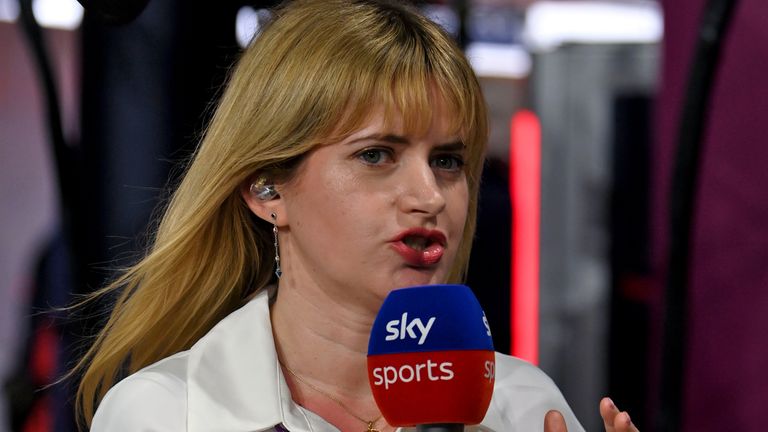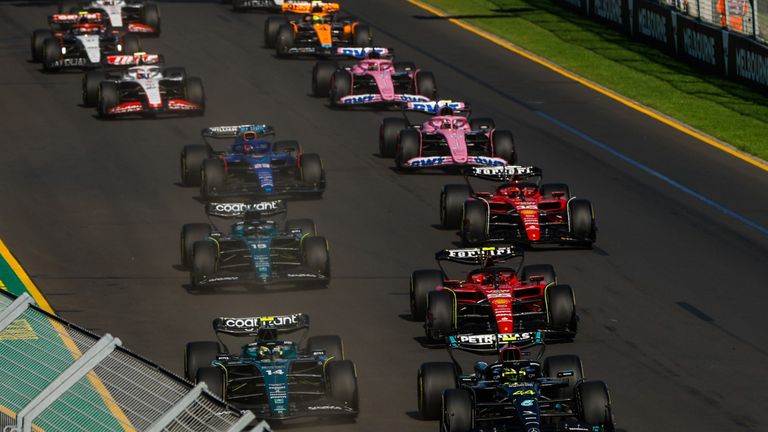The Sky Sports F1 Podcast is your one-stop shop to stay across all the biggest stories in Formula One; Download and subscribe via Spotify, Apple, Spreaker and listen to the latest episode via the podcast player below
Last Updated: 18/04/23 4:55pm

Sky Sports F1 pundit and former Aston Martin head of race strategy Bernie Collins is on the latest Sky Sports F1 Podcast
Bernie Collins is on the latest edition of the Sky Sports F1 Podcast for a special Q&A session on F1 race strategy.
Collins, former head of race strategy at Aston Martin, became part of the Sky Sports F1 team at the start of the season.
On the podcast, which you can listen to via the player below, Collins gives a fascinating insight into life as an F1 strategist, her favourite strategic decision in a Grand Prix, the use of codewords during races, her journey into the sport and much more.
What does an F1 strategist do?
“There’s a million jobs that a strategist does but I think what everyone thinks about is Sunday race day.
“What you are trying to do is plan how the race might go so you’ve got in your head at the start of the race how many stops you think it might be, what tyres you’re going to use but then during the race you are reacting to everything that happens around you – Safety Cars, weather conditions, other drivers etc.
“Ultimately your goal is to get the best possible finish position for your two cars and generally the strategists that you see on the pit wall work across both of the cars on that team. You’re trying to get the best possible points for the team for those drivers.
“But it’s a lot more than that in that we do a lot of planning before we get to the event of what we think it might be, we look at how we might want Friday to go and what we want to learn from the tyres, what other information we’re trying to gain like pit losses or overtaking thresholds.
“Then through qualifying you’re trying to get good track position to give the drivers the best chance of getting a clean lap in, or trying to decide if you need to run again or use a new set of tyres and all these sorts of things.
“Then post-weekend there is a lot of analysis around ‘How did your weekend go? What can we do better? What can we learn?’ So everyone thinks about the race element but there’s a lot before and after as well.”

How often is a race strategy recalculated during a race?
“We recalculate a lot, like every lap or change of position. It’s a mix of strategy software and human calculation.
“A strategy is built up of – if you just think of the fastest race with no interaction with cars – we’re looking at tyre degradation, so how quickly the lap time gets slower through the run, what the pit stop time loss is going to be, the life of the tyre and how many laps you can do on it and the pace delta between the tyres.
“All that makes up your model and through the race the software is giving you some indication that degradation is higher than you expected so the lap-time is getting slower more quickly than you expected it to, or the life of the tyre is shorter.
“There are lots of different inputs to the model. But as humans across the factory and on the pit wall, we’re discussing what changes we want to add to the model at that stage – so we might reduce the life by a few laps and the model will quickly re-calculate what the fastest race is to the end. But we’re debating it all the time whether we think the driver can manage a bit more and stretch out that life or whatever it might be.
“There are a lot of discussions going on and it’s a mix of the software and the human element.”
For more questions and answers, listen to the latest Sky Sports F1 Podcast via the widget above.
Don’t miss an episode of the Sky Sports F1 Podcast. Subscribe now on: Apple Podcasts | Spotify | Spreaker
The Formula 1 season resumes with the Azerbaijan Grand Prix from April 28-30, with the first Sprint weekend of 2023 shown in full live on Sky Sports F1. Watch Saturday’s Sprint at 2:30pm and Sunday’s race at 12pm. Get Sky Sports

